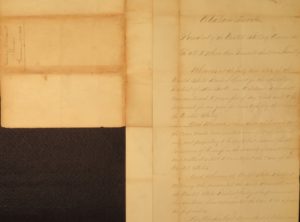 Three presidential pardons dating back to the Civil War and shortly after have been restored at the request of the Monroe County Sheriff’s Office, and will be displayed at the sheriff’s office at the Monroe County Public Safety Building.
Three presidential pardons dating back to the Civil War and shortly after have been restored at the request of the Monroe County Sheriff’s Office, and will be displayed at the sheriff’s office at the Monroe County Public Safety Building.
The pardons were displayed at the old county penitentiary at South and Highland Avenues until it closed in 1971. Then Sheriff Al Skinner gave them to his undersheriff, Andrew Meloni, who later became sheriff himself. Sheriff Meloni kept them until his death in 2015. Sheriff Todd Baxter asked the Meloni family if the department might have them and put them on display.
The historic documents, signed by Presidents Abraham Lincoln, Andrew Johnson and Ulysses Grant, were stabilized and preserved by conservator Gary Albright of Honeoye Falls.
Sheriff Baxter says they’re American treasures, and we’re fortunate and honored to put them on display.
Description of Presidential Pardons:
Presidential Pardons are authorized by Article II, Section 2, Clause 1 of the United States Constitution and
include granting Full Pardons/Clemency, Commutations of Sentence or the rescinding of conviction in regard to Federal Charges.
Although no detailed information could be located regarding the charge(s) and subsequent conviction of the three who received these Presidential Pardons, the following is a summary of their cases and reason for receiving their pardons:
In July 1863, Addison Demeritt pleaded guilty and was convicted of counterfeiting coins of the United
States. He was sentenced to pay a fine of six (6) cents and to be imprisoned for one (1) year. (Note:
During the Civil War, coinage was extremely scarce. There was a flourishing counterfeit trade, based around Montreal, Canada.) President Lincoln granted a full and unconditional pardon on January 18th, 1864, as it was determined that these coins were in fact made and issued for the “convenience of business” and not to defraud the government through counterfeiting.
In November 1864, Selah North, the Postmaster in Clarendon, N.Y., pleaded guilty and was convicted
of “abstracting letters for the United States Mail.” He was charged with opening letters and
appropriating (stealing) stamps. He was sentenced to pay a fine of $2,000.00 and to be imprisoned for
one (1) year. He served the majority of his sentence and as recommended by the U.S. Attorney and the
U.S. Judge, he was granted a full and unconditional pardon by President Andrew Johnson on July 1st,
1865.
On March 24th, 1874, Henry Morris, aka William H. Beacon, pleaded guilty and was convicted of
having been in the possession of and passing counterfeit money. He was sentenced to pay a fine of $1,000.00 and imprisoned for a term of three (3) years. Upon the recommendation of both the U.S. Attorney and the presiding Judge, Henry Morris, aka William H. Beacon, received a full and unconditional pardon by President Ulysses S. Grant on December 9th, 1875.
